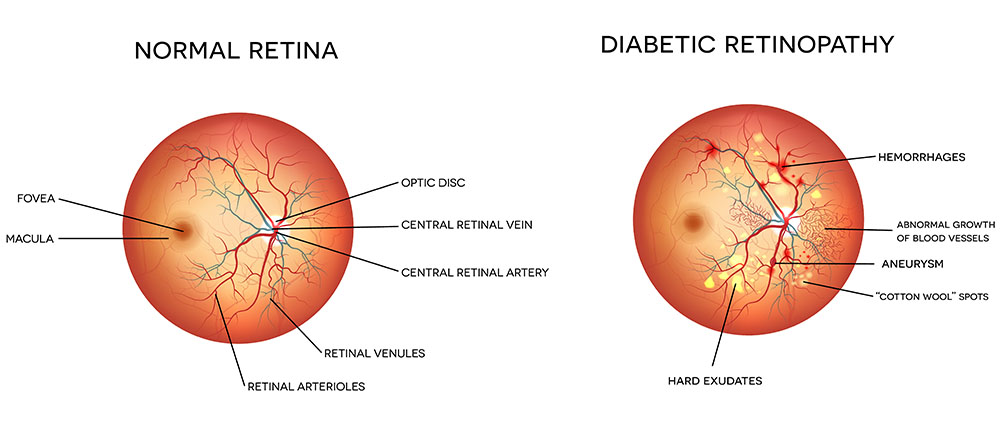All people with diabetes are at risk of developing diabetic retinopathy. At Grand Rapids Ophthalmology, our retinal specialists Drs. Gindzin and Gohel, use the most advanced technology available when treating patients with diabetic retinopathy.

What is diabetic retinopathy?
Diabetic retinopathy occurs when the blood vessels in the retina become damaged. The retina is the light-sensitive tissue located at the back of your eye. Damage to this tissue can lead to vision problems, including blindness.
As the name suggests, diabetic retinopathy is a complication of diabetes. Your chances of developing this condition increase the longer you have diabetes. If you do not control your blood sugar levels, you are more likely to develop diabetic retinopathy.
Are there other risk factors for diabetic retinopathy?
Many of the risk factors for diabetic retinopathy are directly related to diabetes, including letting your blood sugar levels get too high. High blood pressure, high cholesterol, and tobacco use are also risk factors. Pregnant women are at a higher risk as well. You are also at a higher risk if you are African-American, Native American, or Hispanic.
What are the signs of diabetic retinopathy?
Diabetic retinopathy often progresses slowly. Most people first notice diabetic retinopathy when they experience vision problems, such as blurry vision.
You may see floating strings or dark spots in your vision, known as floaters. If you are experiencing any of these problems, you should see an eye doctor or specialist at Grand Rapids Ophthalmology right away.
What causes diabetic retinopathy?
Diabetic retinopathy occurs when the blood vessels in your eye become damaged. Those blood vessels can become blocked due to too much sugar in the blood.
When the blood vessels become blocked, your retina does not receive enough blood. Your eye tries to grow new blood vessels, but they can develop abnormally. Sometimes the new blood vessels leak.
The diabetic retinopathy condition advances in stages:
- In the early stage of the disease, the walls of the blood vessels in the retina become irregular, causing them to weaken and bulge. The vessels can begin to leak fluids, including blood, into the retina. The nerves in the retina can swell, too.
- As the condition advances, abnormal blood vessels begin to grow in the retina. They can leak into the vitreous, which is the clear area in front of the retina.
How severe is diabetic retinopathy?
Diabetic retinopathy is a serious condition. It can lead to vision problems and even blindness if left untreated. If you have diabetes, Grand Rapids Ophthalmology can help you protect your vision.
Diabetic retinopathy and abnormal blood vessel growth can lead to these complications:
Vitreous hemorrhage:
Vitreous hemorrhage happens when the abnormal blood vessels bleed into your eye. The bleeding occurs in the vitreous.
Glaucoma:
Glaucoma occurs when the abnormal blood vessels cause pressure to build up in your eye. Glaucoma can damage the optic nerve and result in blindness if left untreated.
Retinal detachment:
With retinal detachment, abnormal blood vessels cause scar tissue to grow. The scar tissue pushes the retina away from the tissue designed to support it.
What can I do to protect myself from diabetic retinopathy?
The best thing you can do to protect yourself from diabetic retinopathy is to take care of your health. Taking care of yourself means keeping your diabetes in check. These steps can help reduce your risk for the condition:
- Check your blood sugar levels regularly, as directed by your doctor.
- Schedule yearly eye exams.
- Manage your diabetes and follow an appropriate diet. Be sure to take your medications as instructed by your doctor.
- Manage other health conditions, such as high blood pressure or high cholesterol.
- Quit smoking if you are currently a smoker.
- Get enough exercise. Exercise is essential when managing diabetes. It can also help keep your blood pressure and cholesterol levels lower.
Schedule an Appointment
Schedule an appointment today to experience the GRO difference. Call 616.588.6598 or click here.






